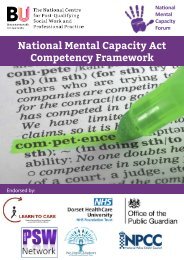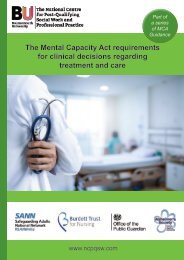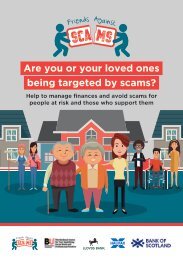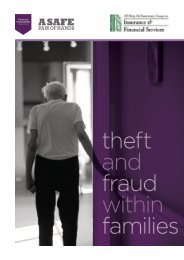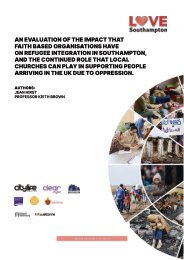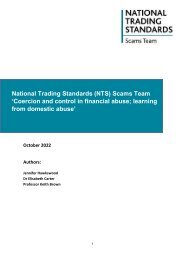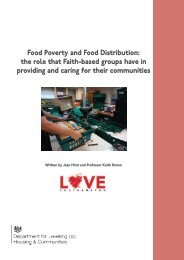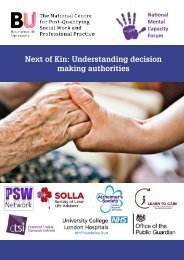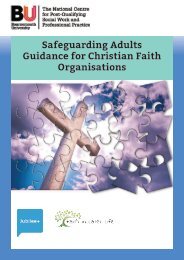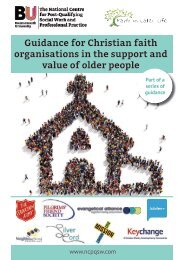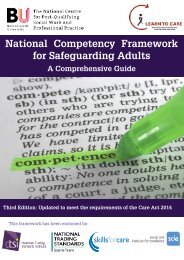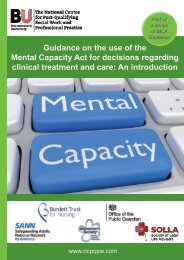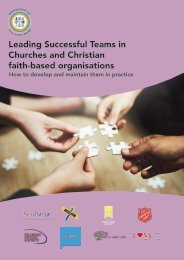Loneliness in Older People - Online
Some of the isolation and loneliness which people in the Fourth Age experience is due to the ageism in our society and in our churches. It is now time for churches to stand-up to the prejudices and discrimination of older people, to challenge the ageism we see in society and show that people in the Fourth Age are valued, celebrated, respected and included. Churches and Christian faith organisations should be leading the way to reach out to older people, to tackle ageist views and attitudes and demonstrate that older people matter.
Some of the isolation and loneliness which people in the Fourth Age experience is due to the ageism in our society and in our churches. It is now time for churches to stand-up to the
prejudices and discrimination of older people, to challenge the ageism we see in society and show that people in the Fourth Age are valued, celebrated, respected and included. Churches
and Christian faith organisations should be leading the way to reach out to older people, to tackle ageist views and attitudes and demonstrate that older people matter.
You also want an ePaper? Increase the reach of your titles
YUMPU automatically turns print PDFs into web optimized ePapers that Google loves.
Forewords<br />
Professor Keith Brown<br />
Chair of the NHS Safeguard<strong>in</strong>g<br />
Adults National Network<br />
Faith <strong>in</strong> Later Life Ambassador<br />
<strong>Lonel<strong>in</strong>ess</strong> and isolation can have a devastat<strong>in</strong>g impact on <strong>in</strong>dividuals of all ages, but older people,<br />
particularly those <strong>in</strong> the fourth age, are more likely to experience lonel<strong>in</strong>ess and isolation and the<br />
associated impacts on wellbe<strong>in</strong>g. One of the reasons I am so committed to rais<strong>in</strong>g an awareness<br />
of these issues orig<strong>in</strong>ated a few years ago whilst work<strong>in</strong>g with the National Trad<strong>in</strong>g Standards<br />
Scams team to evaluate the impact of telephone call block<strong>in</strong>g technology. We have all seen and<br />
witnessed the rise of f<strong>in</strong>ancial scams and fraud over recent years, and I have been privileged to<br />
lead national research <strong>in</strong>to this area. The government funded project <strong>in</strong>volved fitt<strong>in</strong>g telephone<br />
call block<strong>in</strong>g devices <strong>in</strong>to people’s homes where they were deemed to be at risk of scams due to<br />
their vulnerability, and there was a previous history of be<strong>in</strong>g a victim of this type of crime. Many of<br />
the participants had been receiv<strong>in</strong>g 30, 40 or even 50 plus scam calls per week from crim<strong>in</strong>als (I call<br />
them crim<strong>in</strong>als because this is exactly what scammers are).<br />
The project was designed to measure whether the call blockers had any impact on the person’s<br />
wellbe<strong>in</strong>g and clearly, we were hop<strong>in</strong>g for a positive result. You will be pleased to hear that, overall,<br />
there was a positive correlation between the use of call block<strong>in</strong>g technology and mental wellbe<strong>in</strong>g;<br />
however, these results were not straightforward to demonstrate. What happened for many people<br />
tak<strong>in</strong>g part <strong>in</strong> the project was that rather than receiv<strong>in</strong>g 30, 40 or 50 plus calls a week from crim<strong>in</strong>als,<br />
they received no calls at all - from anybody. The call block<strong>in</strong>g technology was extremely effective<br />
<strong>in</strong> block<strong>in</strong>g calls from crim<strong>in</strong>als, but nobody else was call<strong>in</strong>g. It was a huge shock to discover that<br />
many participants had disconnected the call blocker as they preferred to have crim<strong>in</strong>als call them<br />
rather endure their phone fall<strong>in</strong>g silent. This was a real wake-up call to us. <strong>Lonel<strong>in</strong>ess</strong> and isolation<br />
are such terrible th<strong>in</strong>gs to experience and it is so devastat<strong>in</strong>g to th<strong>in</strong>k that many people would<br />
rather speak to crim<strong>in</strong>als attempt<strong>in</strong>g to defraud them out of their sav<strong>in</strong>gs rather than to have no<br />
contact with the outside world. This experience left me determ<strong>in</strong>ed to raise the issues and impact of<br />
lonel<strong>in</strong>ess and isolation with<strong>in</strong> our society.<br />
Churches and Christian faith-based organisations are often at the forefront of provid<strong>in</strong>g pastoral<br />
and practical support to older people <strong>in</strong> our society and we wanted to cont<strong>in</strong>ue our support for<br />
this work by produc<strong>in</strong>g this latest guidance for those engaged <strong>in</strong> support<strong>in</strong>g older people. Karen<br />
Grimshaw and I have been lifetime friends s<strong>in</strong>ce we first met at university <strong>in</strong> the early 1980s and<br />
we have both spent all of our professional lives work<strong>in</strong>g <strong>in</strong> this area, publish<strong>in</strong>g national guidance<br />
for Health and Social Care professionals. More recently, we have teamed up with Faith <strong>in</strong> Later Life<br />
and other Christian organisations to produce guidance based on our national work, but tailored<br />
for churches and Christian faith-based organisations. We would not describe ourselves as Christian<br />
leaders. but rather leaders who are Christians. Our professional experiences and credibility are at<br />
the heart of what we do, and we want to promote professional excellence; but we unashamedly do<br />
this from our own personal Christian faith perspective.<br />
To those of you who tirelessly provide support to the marg<strong>in</strong>alised, the lonely and isolated older<br />
people, can we both thank you and encourage you to keep go<strong>in</strong>g. To those who are th<strong>in</strong>k<strong>in</strong>g about<br />
sett<strong>in</strong>g up support networks and systems <strong>in</strong> these areas can we encourage you to get go<strong>in</strong>g - your<br />
work will be so vital to many - and to those of you who are just th<strong>in</strong>k<strong>in</strong>g about this for the first time<br />
and you don’t know where to start, please just do someth<strong>in</strong>g as it really will make a difference. It is<br />
our hope and desire that this latest guidance will help and assist <strong>in</strong> promot<strong>in</strong>g support systems for<br />
older people from churches and Christian faith-based organisations.<br />
3 | <strong>Lonel<strong>in</strong>ess</strong> <strong>in</strong> <strong>Older</strong> <strong>People</strong>



